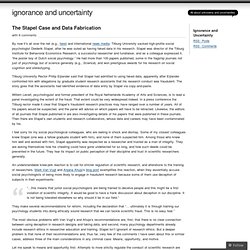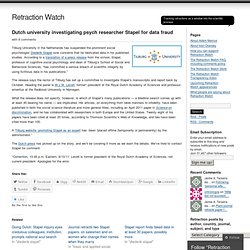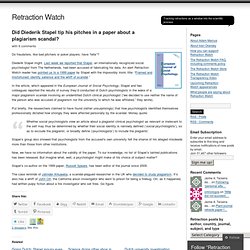

New scientist: Psychologist admits faking data in dozens of studies - science-in-society - 02 November 2011. In one of the biggest cases of scientific fraud on record, a prominent psychologist has admitted fabricating data in dozens of studies.

Diederik Stapel, who was suspended from his post at Tilburg University in the Netherlands in September, was exceptionally productive. He was responsible for a succession of eye-catching studies on topics including stereotyping and discrimination, the effectiveness of advertising, and the circumstances in which people may perversely prefer negative feedback to praise. Stapel was suspended after three junior researchers alleged scientific misconduct. But the extent of the problems became known only on Monday, when the university released an interim report concluding that dozens of papers, as well as 14 out of the 21 PhD theses Stapel had supervised, contain fabricated data.
Nature: Report finds massive fraud at Dutch universities. Groninger Universiteitskrant. The road to fraud starts with a single step. The Washington Post: D. Stapel The Lying Dutchman. Posted at 05:38 PM ET, 11/01/2011 Nov 01, 2011 09:38 PM EDT TheWashingtonPost Big science news today out of the Netherlands: A top social scientist, Diederik Stapel, of Tilburg University, has been suspended after an investigation showed that he’s been fabricating his data for years.

This may seem far away and esoteric in the extreme, but there’s collateral damage here in DC, home base of the AAAS journal Science, which published one of Diederik Stapel’s papers in April. That paper, “Coping With Chaos: How Disordered Contexts Promote Stereotypying and Discrimination,” claimed that people were more likely to be prejudicial toward others when in the presence of litter, a broken sidewalk, an abandoned bicycle, etc. The problem is, there may not have been any experiment upon which this conclusion was based. “Many of Stapel’s students graduated without having ever run an experiment, the report says. His students were victims, too — and ultimately realized that they were being taken for a ride. He Forged Psych Data For Fame And Money.
Occasionally I remind myself (and you, dear reader) that some psychological research studies are, like any other kind of research studies, prone to inaccuracy.

This can be due to biased researchers or funding sources or simply and innocently due to inadequate sample sizes or inaccurate data collection or analysis. But I just read about some outright forgery. Like most people, I believe that the majority of researchers want to make breakthrough discoveries in order to help make the world a better place. But I also believe that ego gratification enters into ambition too. And frankly, that is perfectly normal. Kahn: Social psychology: like medical science (except it doesn’t kill you)
Diederik Stapel: Another World Class Psychology Fraud. Were you buying it when Diederik Stapel of Tilburg University in the Netherlands claimed meat was behind all the aggression we humans have?

Vegetarians were, sure, along with plenty of other anti-science hippies when a supposed study matches their world view and gives them a jolt of dopamine, but most of us just shook our heads. Stapel also did a study claiming scientists discriminated more if their labs were messy. Really, psychologists can lament they are not taken more seriously but they did little to police their own - until recently.
Marc Hauser was forced to resign, Satoshi Kanazawa finally got the ridicule he deserved, and now an investigation shows Stapel committed data fraud in dozens of publications and even 2/3rds of the theses he supervised were 'tainted'. He has apologized and said he "failed as a scientist" but we have to give him a break on that one; he was never a scientist so he could not have succeeded anyway. The Stapel Case and Data Fabrication « ignorance and uncertainty. By now it’s all over the net (e.g., here) and international news media: Tilburg University sacked high-profile social psychologist Diederik Stapel, after he was outed as having faked data in his research.

Stapel was director of the Tilburg Institute for Behavioral Economics Research, a successful researcher and fundraiser, and as a colleague expressed it, “the poster boy of Dutch social psychology.” NYT: Noted Dutch Psychologist, Stapel, Accused of Research Fraud. The Fraud Who Fooled (Almost) Everyone - Percolator. It’s now known that Diederik Stapel, the Dutch social psychologist who was suspended by Tilburg University in September, faked dozens of studies and managed not to get caught for years despite his outrageous fabrications.

But how, exactly, did he do it? That question won’t be fully answered for a while—the investigation into the vast fraud is continuing. Ktwop: Diederik Stapel faked at least 30 papers. Social psychology is going to take a beating over the Diederik Stapel fraud.

It provides ample fuel for the view that social psychology is no science but merely the half-baked opinions of narcissists and charlatans. Ego trips and TV appearances have governed the field rather than any scientific rigour. The interim report of the investigation being carried out by the of Universities of Tilburg and Groningen which started in mid September is now out. Dutch university investigating psych researcher Stapel for data fraud. Tilburg University in the Netherlands has suspended the prominent social psychologist Diederik Stapel over concerns that he fabricated data in his published studies.

According to a translation of a press release from the school, Stapel, professor of cognitive social psychology and dean of Tilburg’s School of Social and Behavioral Sciences, “has committed a serious breach of scientific integrity by using fictitious data in his publications.” The release says the rector of Tilburg has set up a committee to investigate Stapel’s manuscripts and report back by October. Heading the panel is W.J.M. Levelt, former* president of the Royal Dutch Academy of Sciences and professor emeritus at the Radboud University in Nijmegen. What the release does not specify, however, is which of Stapel’s many publications — a Medline search comes up with at least 45 bearing his name — are implicated.
The Dutch press has picked up on the story, and we’ll be covering it more as we learn the details. Framed and misfortuned: identity salience and the whiff of scandal - Stapel - 1999 - European Journal of Social Psychology. Did Diederik Stapel tip his pitches in a paper about a plagiarism scandal? Do fraudsters, like bad pitchers or poker players, have “tells”?

Stapel onderzocht zelf wetenschapsfraude scienceguide. ANS: *Stapel schreef artikel over wetenschappelijke fraude. De schrikbarende conclusies omtrent de vleesaffaire stapelen zich op.

Nu blijkt dat fopwetenschapper Diederik Stapel een artikel publiceerde over de gevolgen van een fraudeschandaal in de wetenschap, meldt Folia Web. De frauderende hoogleraar schreef in 1999 met twee collega’s een artikel met de titel Framed and misfortuned: identity salience and the whiff of scandal. In het onderzoek werden sociaal psychologen gevraagd om aan te geven hoe een niet nader gespecificeerd fraudeschandaal hen en hun vakgebied beïnvloedde. Hoe sterker de respondenten zich identificeren met de fraudeur, hoe groter ze de impact op zichzelf en hun vakgebied beoordelen. Om welke frauderende hoogleraar of welke universiteit het gaat, wordt niet vermeld. As Dutch Research Scandal Unfolds, Social Psychologists Question Themselves - Research.
By Christopher Shea The discovery that the Dutch researcher Diederik A. THE: Research intelligence - Black hole at heart of star's collapse. Dutch begin documenting top psychologist’s supermassive fraud. Paul Jump reports The old adage that if something seems too good to be true, it probably is was never more aptly demonstrated than in the case of disgraced psychologist Diederik Stapel. Stapel diet of fraud. Miles Hewstone discusses a heinous data-faking scandal and the lessons that must be learned to stop the ‘betrayers of the truth’ Credit: Elly Walton Attempting to view and download the publications of the prolific social psychologist Diederik Stapel recently, I drew a blank - literally.
His web page at Tilburg University in the Netherlands is empty, but his name is on many lips: what has already been dubbed “Stapelgate” threatens to be one of the biggest data-faking scandals in the history of the social sciences. Stapel was a wunderkind of European social psychology who accrued numerous publications in leading outlets and gleaned major awards for his research. He was also a senior editor of the Personality and Social Psychology Bulletin, one of the most prominent journals in the field. In a respected book published in 1982, William Broad and Nicholas Wade, journalists on The New York Times, called people of Stapel’s ilk “betrayers of the truth”.
Diederik stapel News, Videos, Reviews and Gossip - io9. Noted Dutch Psychologist, Stapel, Accused of Research Fraud.